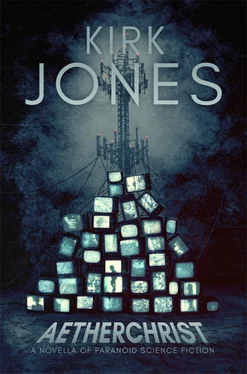The television inside loops the last twenty seconds as I’m recovering, from “Rey killed them” to the gunshot blast. I’m unsteady on my feet, but I stumble back down the hallway to unplug the set and destroy it. It shows me thumbing through some dusty lined paper. Random equations and writing are scrawled on the pages. It flashes rhythmically on the screen.
I turn to channel 13: still dead.
I unplug the television and smash it against the corner of Wayne’s television stand, hoping I’ll find more answers next door.
* * *
The treetops look like spindly, webbed fingers grasping at the receding darkness. At least that’s how I see them. I want to believe they feel the same way I feel when dawn breaks, that sunrise always comes too early, withering the darkness inside us until it is brittle and weak enough to be contained by our fear of prying eyes. But the sun itself hasn’t crept above the mountains yet, and the white light splashed across the concrete in Bill’s garage obscures what little light has managed to work through the bud-and-branch weave on the horizon. The televisions roar, the chorus of empty frequencies obscuring the sound of my movement as I walk in.
I watch the screens flicker asynchronously, revealing faint images. It’s me. I know already it’s me behind the curtain of feedback, but I keep watching. In part, I watch because I want to see what’s going to happen next. In part, I keep watching because I just heard a hammer ease into position through the barrel of a revolver. Judging from the sound, it’s poised to send my cerebellum through my chin. I wait to see myself shitting my pants on the screens, but it’s just me vomiting off the front steps of Wayne’s house.
“They’re dead, aren’t they?” Bill asks from behind me.
I nod slowly.
He circles around me until I see him. He holds the gun with both hands. Braided strands of copper wire jut out of the meat of his forearm. They run down the length of his body and into the neighboring room. “Is that how you override my transmission, through sacrifice?”
“What?”
He places the barrel of the gun under my chin and pushes it up gently. “You’ve been clogging half of the VHF frequency with your shit since you came into town. How are you doing it?”
“You’ve got the entire town under surveillance. Why don’t you tell me?”
“I think you’ve got it backward. I don’t need to watch anybody in this town. Everyone in a hundred-mile radius, they’re all tuned in to me. I’m one with the aether. But you’re fucking with my programming.” He points to the images of me on the televisions. “Those pictures on the television, that’s all your doing. You’re putting that on the airwaves.”
“Nobody even uses analog anymore. Why would I waste my time with it? And why would I incriminate myself by putting this shit on the airwaves?”
Bill draws the gun up to my forehead. “Somehow, whether you’re aware of it or not, you’re interfering with my work. If you’re oblivious to what’s happening, you’re worthless to me and I’m going to kill you. If you know what you’re doing and you don’t tell me how, I’m going to kill you.” He looks me over to see if I’m taking him seriously. “I’m willing to accept that you’re confused, but you know something’s going on. So, let’s start with the questions you’ve been asking me and the accusation you made about me watching this entire town.”
I swallow and try to form words. “Wayne’s house. Their TV.” I swallow again, but I’m bone dry and my voice starts to fail me. “I—I was on their television. I checked for cameras, video equipment.”
“Didn’t find anything, did you?”
“No.”
“There are no cameras. You’re the one putting that shit on the airwaves.”
“I don’t have any equipment.”
He points to his head. “It’s up here.” He stares at the television, and a plastic face with sunglasses shakes on one of the screens. “You’re not the first one I’ve run into. Back in the Eighties, I had to follow a transmission all the way to Chicago. Some crazy bastard dressing up like that robot from the soda pop commercials, fucking with local stations. I figured he was the last.” The image of the man transitions to the same masked man, dead in an alleyway. “Got to eliminate the competition.”
“I’ll stop. Whatever it is I’m doing, I’ll stop if you show me how.”
“I know you’ll stop.” Bill stares at another television until I appear on screen. I’m dead, lying in a pool of my own blood, but it’s different than the image I saw on channel 13. I wonder if this is how it happens. Some schizophrenic old man blows my brains out because he’s convinced I’m broadcasting my crimes to the local population. I think of Lana and realize the past few days have taken me so far from anything that happened before I got to the outskirts of Springfield. She’s the one thing I’ve managed to hold on to, and even she’s only an intimation of the friendship we once had. She’s been relegated to a piecemeal body. She’s now isolated images of tits and ass. There’s no composite Lana left in my mind. Like her, everything else has been fragmented as well. Maybe I’m better off dead…
“Please don’t kill me,” I say, but Bill’s not listening anymore. The gun is at his side, and he’s staring at the screens. My life’s flashing before my eyes on thirty-two-inch sets, past, present, and future. On the lower right screen, I lay dead. The next television on the lower right shows me running through the forest. The next shows Bill, dead from a gunshot wound to the head. They all strobe the images of me, interspersed by white noise, maddening white noise that looks like maggots squirming through something fetid and black in fast forward. The empty airwaves are alive, or they’re devouring something alive.
I squint and turn away from the light. “Why are they flashing like that?”
“Morse code,” Bill says, still staring at the televisions.
They continue to flicker, faster now, like someone perpetually scanning channels for something meaningful, or something to drown out meaning altogether.
“I am analog.” He looks at me, then waits for the cycle of flashes to run their course again. “I’m analog.” He focuses on the televisions. “Stop!” he shouts at me.
“I’m not doing anything!”
He points the gun in my direction. “Goddamn you. Stop it!” He turns the gun to his head slowly, as if he’s struggling against himself.
I look up at the television and see him watching himself pull the gun to his head, his eyes wide with terror.
I reach out to pry his fingers away from the gun. It’s no use. His grip is too strong.
“Stop me!” he shouts.
I pull on his arm with all of my strength. “No-no-no-no!” I’m too late. His arm snaps the gun to his temple, and the shot reverberates through the room.
I reach down to follow the steady rhythm of Bill’s flesh as it throbs near his forearm. I’m hopeful for a moment that he’s still alive, but that’s impossible. The copper wire is live, flowing to or from Bill into the back room. It simulates a pulse, but half of Bill’s face is scattered across the televisions behind him.
I follow the wiring into the house. It connects to a myriad of dated editing tools and satellite hardware. Small-screen monitors, dozens of them, record every large antenna for miles.
Not watching the town my ass. I’ve got to find these cameras.
The walls are covered in schizo rhetoric: “I am analog,” and “I am the Aetherchrist.” A pile of composition notebooks, those old fuckers that have covers, which—perhaps not so coincidentally—kind of look like a still frame of television static magnified, are stacked on a small desk in the corner. They’re filled with hand-drawn diagrams: Radio towers resting on top of the entire planet, annual flight patterns for geese, transmission patterns from analog towers, and maps of satellite systems in the United States that could be used to carry analog patterns through digital systems. I flip through several pages until I come to his notes on the body-machine interface. The diagrams show how wiring can be tethered to veins, how shrink tube can be tightened to vein and wire alike. Even the diameters for shrink tube relative to vein size are noted.
Читать дальше












